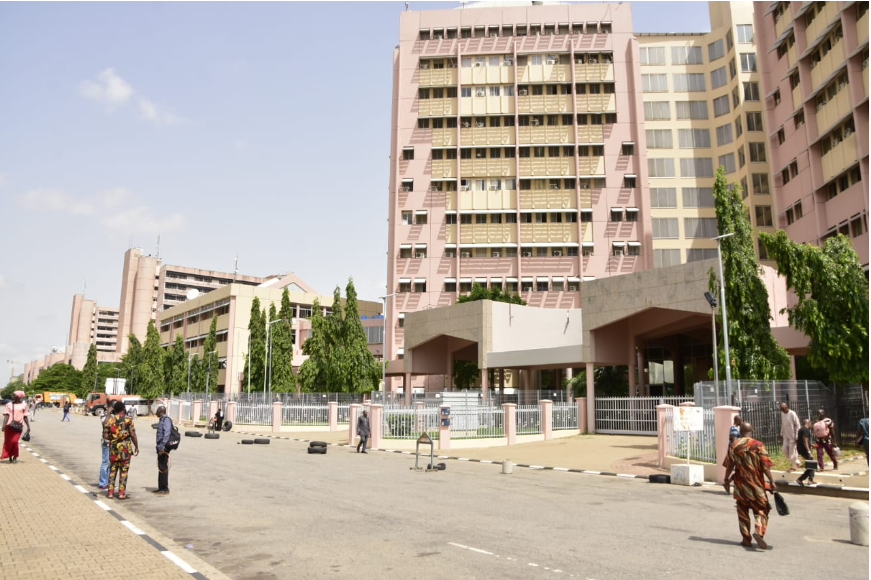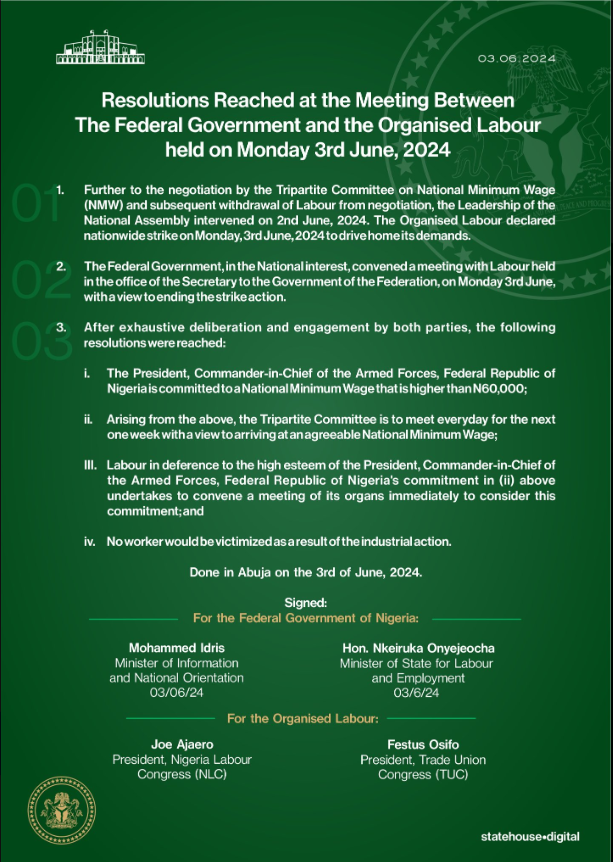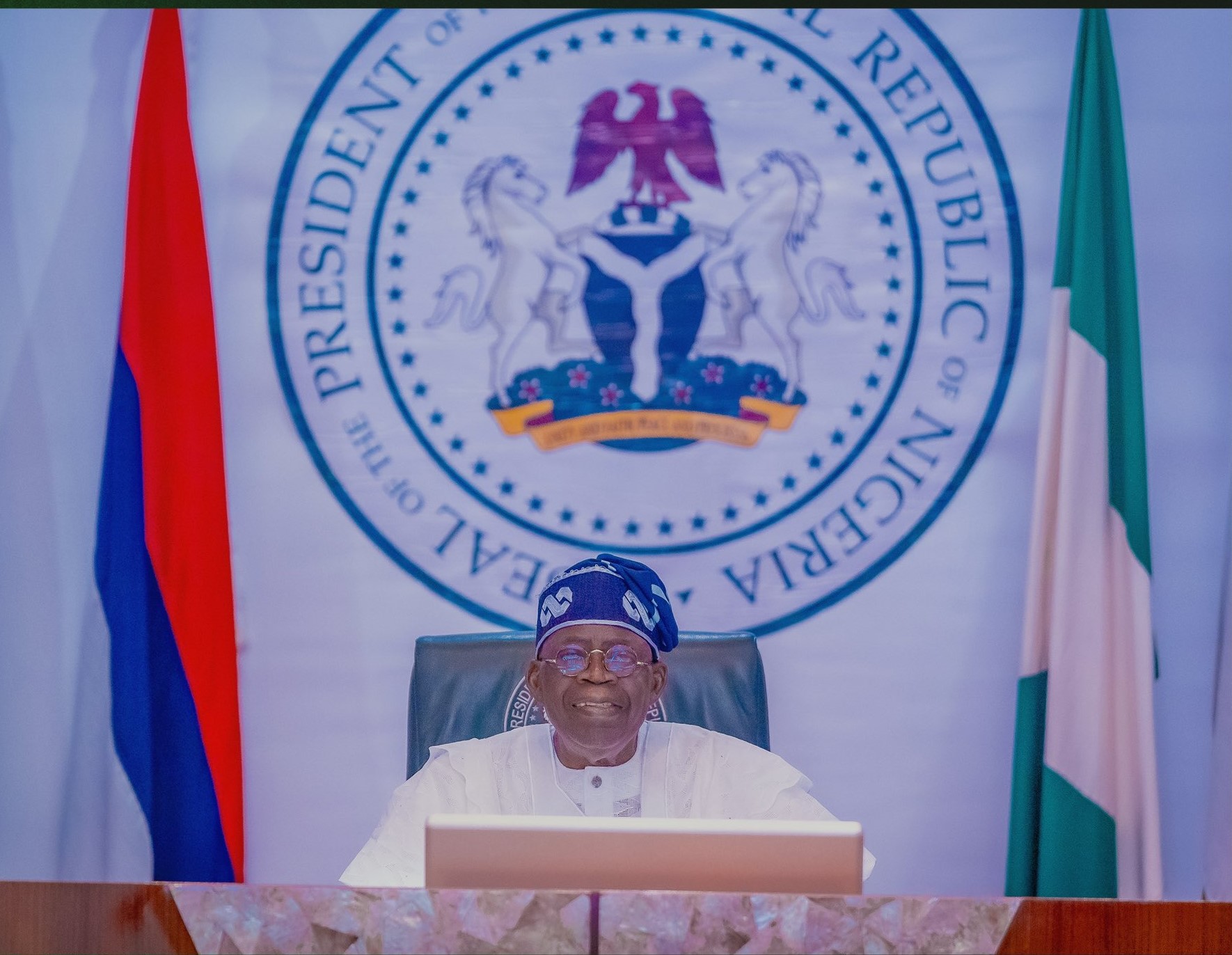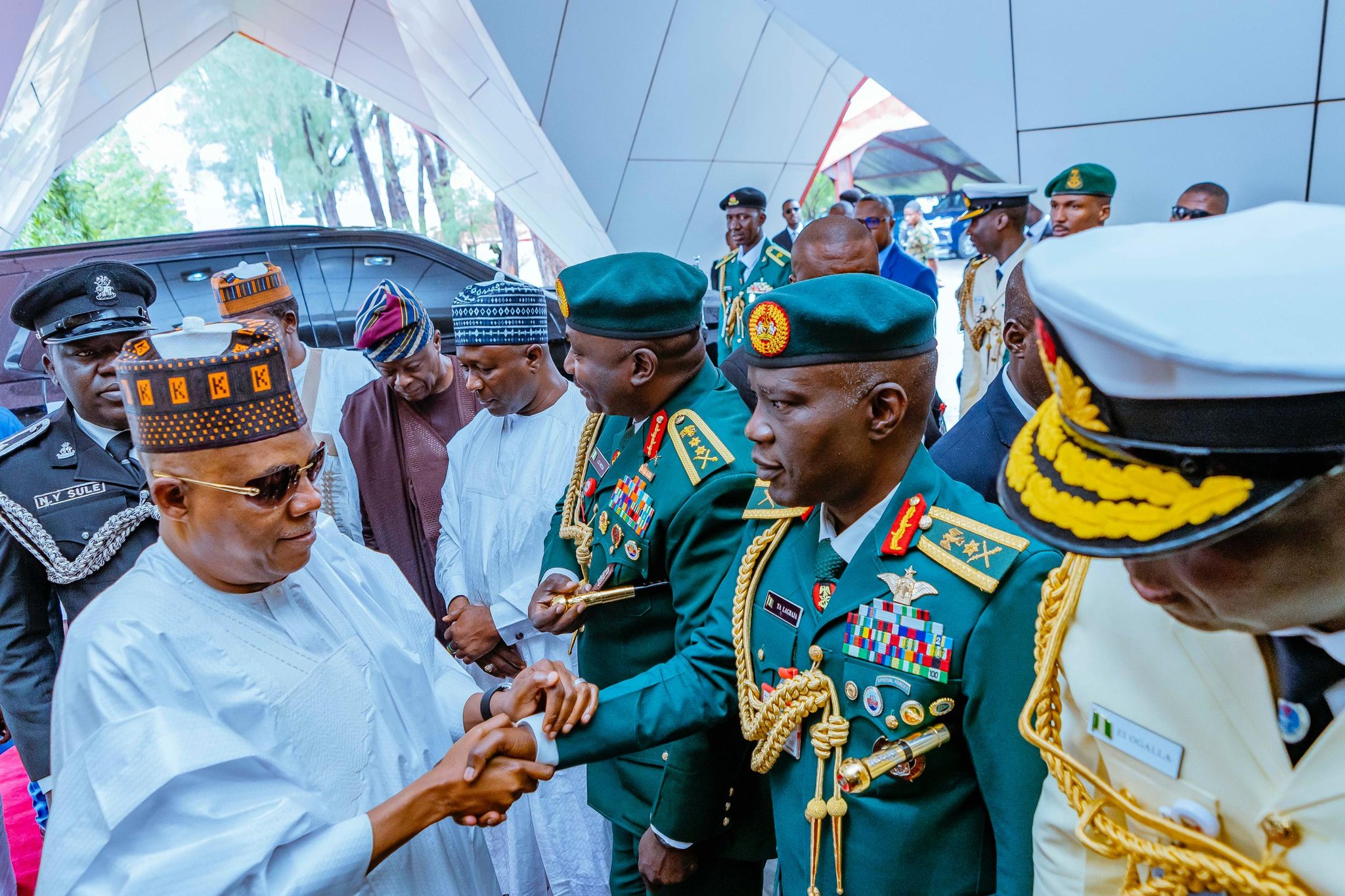By Joke Kujenya
A MAJOR breakthrough has likely been achieved in the ongoing industrial action as the Federal Government and organized labour have reached a pivotal agreement.
Following a marathon six-hour meeting held on Monday evening in Abuja, at the office of the Secretary to the Government of the Federation (SGF), George Akume, hopes of a soon resolve shine.
Trade Union Congress (TUC) President Festus Osifo announced the outcome of the meeting, which included key figures such as Nigeria Labour Congress (NLC) President Joe Ajaero, Minister of Information and National Orientation Mohammed Idris, and Minister of State for Labour and Employment Hon. Nkeiruka Onyejeocha.
It was noted that President Bola Tinubu has reaffirmed his commitment to a minimum wage above N60,000, addressing a key demand from labour unions.
The President, it was noted, mooted the idea that the Tripartite Committee on National Minimum Wage will convene daily for the next week to finalize the details of this commitment and he also gives assurances that no worker would face retribution for participating in the strike.
Eventually, the six-hour meeting concluded with a communiqué signed by representatives from both sides comprising Idris and Onyejeocha for the government, and Osifo and Ajaero for the labour unions.
The document, it was also noted, underscored the President’s dedication to a substantial wage increase and outlined the immediate steps for ongoing negotiations.
Highlights of the Agreement
Minimum Wage Commitment: President Tinubu has committed to a minimum wage surpassing N60,000.
Daily Negotiations: The Tripartite Committee will meet daily over the next week to reach a consensus on the new minimum wage.
No Retaliation: The government pledged that no worker would face punitive actions for their involvement in the strike.
Labour Consultations: Labour leaders agreed to immediately consult with their respective organizations to discuss the government’s offer.
The strike, which began on Monday, June 3, in response to unmet wage demands and the reversal of an electricity tariff hike, significantly disrupted key sectors, including aviation, power, banking, and telecommunications. Major cities like Lagos, Kano, and Abuja saw extensive compliance, with workers shutting down public offices, banks, and transportation services.
NLC’s Continued Stance
Despite the agreement, the NLC’s official handle on X (Twitter) insists, “Until we hear from our Organs at the Meeting scheduled for today, 4th June 2024, we are still on strike,” to reflect the ongoing uncertainty and the need for further internal consultations within the labour unions.
Economic Impact and Reactions
Without a doubt, in the strike’s first 24-hour, it has had far-reaching economic implications, with flights canceled, the national power grid shut down, and banks partially closed.
Also, the Transmission Company of Nigeria (TCN), had announced a nationwide power outage, further intensifying the situation as manufacturers and small businesses struggled with soaring fuel and diesel costs.
Yesterday in a press conference, Minister of Information, Mohammed Idris highlighted the financial strain of meeting labour’s demand for a N494,000 minimum wage, which would balloon the annual wage bill to N9.5 trillion.
He said it was this financial consideration that has prompted the government to call for a return to the negotiating table.
Despite the severe disruptions, the Nigerian Medical Association confirmed that its members continued to provide medical services, emphasizing their exclusion from the industrial action.
Moving forward however as negotiations continue, President Tinubu has advised labour to convene a meeting of all its organs, with the hope that the strike will be called off by Tuesday.
The President notes that the immediate focus remains on reaching a sustainable and agreeable minimum wage that balances economic feasibility with the needs of workers.
Noting that the government’s latest commitment to a wage above N60,000 marks a significant step, President Tinubu affirms that the final outcome will depend on the ongoing daily negotiations and the willingness of both parties to find common ground.
He also said that the resolution of this industrial action is critical not only for restoring normalcy but also for setting a precedent for future labour-government relations in Nigeria.

Meanwhile, officers of the Nigerian Army, soldiers, were reported to have prevented journalists from gaining entry into the meeting after allowing only government officials into the office of the Secretary to the Government of the Federation (SGF).
At JKNewsMedia, our dedication to delivering reliable news and insightful information to our cherished readers remains unwavering. Every day, we strive to provide you with top-notch content that informs and enlightens. By donating to JKNewsMedia, you directly contribute to our mission of delivering quality journalism that empowers and informs. Your support fuels our commitment to bringing you the latest updates and in-depth analysis. Let's continue to uphold the highest standards of journalism and serve our community with integrity and dedication. Thank you for being a part of the JKNewsMedia family and for your ongoing support.






The SGF has now mandated the tripartite committee to meet daily in order to resolve and agree on a new acceptable minimum wage when the committee had the entire month of May (after organised labour notice)to do that, but was foot dragging. We have to get serious with governance and give priority to the well-being and welfare of Nigerians as a people
I completely agree with you on the essential need to get serious with governance in this country. Each successive government will come and toy with labour and workers, while they live large at the expense of same workers’ taxes being deducted from their insufficient wages. They should just come to their senses once and for all.
Thank you for reading us and sharing your views.